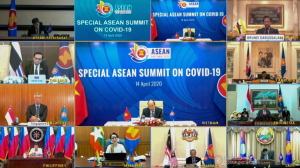In early March, the UN High Commissioner for Human Rights Michelle Bachelet urged all nations impacted by the new coronavirus – which now has spread to about 210 countries and territories – to ensure human rights are put at the center of the highly contagious outbreak.
She also stated that while it is essential that governments introduce measures to impede the spread of COVID-19, additional action is required to reduce the potentially negative impact of such measures on people’s lives.
Then, two weeks later, UN human rights experts warned states to avoid overreaching security measures in their response and reminded them that emergency powers being used to combat the spread should not be used to quash dissent.
Yet human rights groups argue that four members within the 10 nations of the Association of Southeast Asia Nations (ASEAN) – the Philippines, Thailand, Cambodia, and Myanmar – have earned themselves a reputation for ignoring those warnings.
Admittedly all four have hardly impressed on the human rights front in recent years. Between them, the Philippines, Thailand, Cambodia, and Myanmar have locked up dissenters, banned opposition political parties, crushed the independent media, and ruled as they please. Thus the allegations should not come as much of a surprise.
But there is something particularly sinister about using a health issue, perhaps the biggest of our times, for political gain and power advantage. It is Orwellian — not necessarily in the sense of a dystopian future but more reminiscent of George Orwell’s coverage of the Spanish Civil War, depicting how leaders would sacrifice their own people for just a little more leverage.
The problem with combatting COVID-19 is the use of lockdowns, travel restrictions, orders to stay at home, and emergency powers that can be used to control the flow of information – the same tools enjoyed by authoritarian states and leaders who rule with impunity.
Phnom Penh now has an excellent state security apparatus, which has steadily improved ever since the ruling Cambodian People’s Party came close to losing elections in 2013.
The same can be said for military-inspired and backed governments in Thailand and Myanmar while in the Philippines the “war on drugs” has enabled President Rodrigo Duterte to marshal his own warlords from within the police and military.
Thus, in Cambodia a journalist is arrested for quoting Hun Sen accurately on COVID-19 – remarks the prime minister later thought were best left out of the press – and charged under a virus-inspired “emergency bill” described by Human Rights Watch as a recipe for dictatorship. Dozens of people have been accused and arrested of spreading “fake news” about the virus on social media, including a 14-year-old girl who was later released.
It’s the same in Thailand where fresh powers under the COVID-19 mandate will enable the government not only to censor but also to shut down the media — an odd response given public participation is required now more than ever. Arrests in Thailand include one man who posted online that he had gone through Bangkok Airport where there were no COVID-19 screenings or health advice from officials. The man was charged under the computer crimes act. Authorities then started arresting homeless people for violating COVID-19 curfews.
In the Philippines, Duterte is living up to expectations and recently ordered his men to “shoot them dead,” referring to anyone who defies the lockdown laws. Then last week seven activists distributing food aid – an essential service by any definition – were arrested and charged with violating the COVID-19 laws.
In Myanmar hundreds of websites have been blocked and many arrested, including street artists who painted murals of the disease and its impact on society on a wall.
Does it really need to be said that ordinary people, along with doctors and their medical staff, must be free and able to talk express themselves openly and honestly about how to treat a disease?
Not all authoritarian countries are being seen in the same light. Vietnam is winning praise for its handling of the COVID-19 crisis.
The remaining countries in ASEAN have had mixed success but none have have been accused by human rights groups of plumbing the same depths as the Philippines, Myanmar, Thailand, and Cambodia.
And then there’s the obvious question: will any of these four countries rescind their new emergency powers once the COVID-19 pandemic is over? That’s about as doubtful as their records.
Luke Hunt can be followed on Twitter @lukeanthonyhunt

































